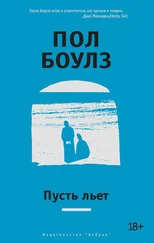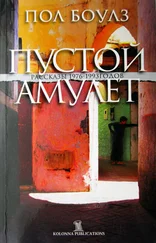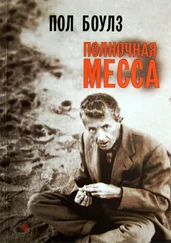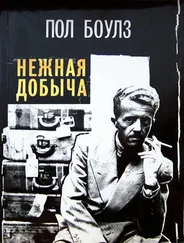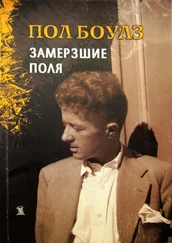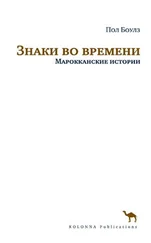Пол Боулз - A Distant Episode
Здесь есть возможность читать онлайн «Пол Боулз - A Distant Episode» весь текст электронной книги совершенно бесплатно (целиком полную версию без сокращений). В некоторых случаях можно слушать аудио, скачать через торрент в формате fb2 и присутствует краткое содержание. Жанр: Современная проза, на английском языке. Описание произведения, (предисловие) а так же отзывы посетителей доступны на портале библиотеки ЛибКат.
- Название:A Distant Episode
- Автор:
- Жанр:
- Год:неизвестен
- ISBN:нет данных
- Рейтинг книги:5 / 5. Голосов: 1
-
Избранное:Добавить в избранное
- Отзывы:
-
Ваша оценка:
- 100
- 1
- 2
- 3
- 4
- 5
A Distant Episode: краткое содержание, описание и аннотация
Предлагаем к чтению аннотацию, описание, краткое содержание или предисловие (зависит от того, что написал сам автор книги «A Distant Episode»). Если вы не нашли необходимую информацию о книге — напишите в комментариях, мы постараемся отыскать её.
A Distant Episode — читать онлайн бесплатно полную книгу (весь текст) целиком
Ниже представлен текст книги, разбитый по страницам. Система сохранения места последней прочитанной страницы, позволяет с удобством читать онлайн бесплатно книгу «A Distant Episode», без необходимости каждый раз заново искать на чём Вы остановились. Поставьте закладку, и сможете в любой момент перейти на страницу, на которой закончили чтение.
Интервал:
Закладка:
Paul Bowles
A Distant Episode
(1910-)
No one who reads this story ever forgets it, though one might well wish to forget it, like a bad dream that imposes itself, with ominous significance, upon the daylight, civilized world. Though "A Distant Episode" has become the most frequently anthologized of Paul Bowles's fiction, I could not resist including it here. It is both the highest achievement of this intransigent artist's work in fiction and representative of his imagination generally.
Born in New York City, Paul Bowles has had two distinct careers: as a composer, and as a writer and translator. During the 1930's and 1940's he was a music critic for the New York Herald Tribune, and wrote musical scores for Broadway. Since 1945, he has lived in Tangier, and has concentrated upon literature. His first novel, The Sheltering Sky, was published in 1949 to considerable acclaim and notoriety; subsequent titles established his reputation as a chronicler of a world almost entirely devoid of the "manners" that constitute most works of fiction in our tradition. These are the story collections The Delicate Prey (1950), The Time of Friendship (1967), and Collected Stories (1979); the novels Let It Come Down (1952), The Spider's House (1955), and Up Above the World (1966). Bowles's nonfiction books include Their Heads Are Green and Their Hands Are Blue: Scenes from the Non-Christian World (1963) and Things Gone and Things Still Here (1977). His poetry has been collected in Next to Nothing (1981) and his autobiography, the enigmatic Without Stopping, was published in 1972.
In 1991, in honor of his contribution to the short story as an art form, Paul Bowles was awarded the $25,000 Rea Award for the Short Story.
A Distant Episode
The September sunsets were at their reddest the week the Professor decided to visit Ai'n Tadouirt, which is in the warm country. He came down out of the high, flat region in the evening by bus, with two small overnight bags full of maps, sun lotions and medicines. Ten years ago he had been in the village for three days; long enough, however, to establish a fairly firm friendship with the café-keeper, who had written him several times during the first year after his visit, if never since. "Hassan Ramani," the Professor said over and over, as the bus bumped downward through ever warmer layers of air. Now facing the flaming sky in the west, and now facing the sharp mountains, the car followed the dusty trail down the canyons into air which began to smell of other things besides the endless ozone of the heights: orange blossoms, pepper, sunbaked excrement, burning olive oil, rotten fruit. He closed his eyes happily and lived for an instant in a purely olfactory world. The distant past returned — what part of it, he could not decide.
The chauffeur, whose seat the Professor shared, spoke to him without taking his eyes from the road. "Vous êtes géologue?" "A geologist? Ah, no! I'm a linguist." "There are no languages here. Only dialects." "Exactly. I'm making a survey of variations on Moghrebi." The chauffeur was scornful. "Keep on going south," he said. "You'll find some languages you never heard of before."
As they drove through the town gate, the usual swarm of urchins rose up out of the dust and ran screaming beside the bus. The Professor folded his dark glasses, put them in his pocket; and as soon as the vehicle had come to a standstill he jumped out, pushing his way through the indignant boys who clutched at his luggage in vain, and walked quickly into the Grand Hotel Saharien. Out of its eight rooms there were two available — one facing the market and the other, a smaller and cheaper one, giving onto a tiny yard full of refuse and barrels, where two gazelles wandered about. He took the smaller room, and pouring the entire pitcher of water into the tin basin, began to wash the grit from his face and ears. The afterglow was nearly gone from the sky, and the pinkness in ob jects was disappearing, almost as he watched. He lit the carbide lamp and winced at its odor.
After dinner the Professor walked slowly through the streets to Hassan Ramani's café, whose back room hung hazardously out above the river. The entrance was very low, and he had to bend down slightly to get in. A man was tending the fire. There was one guest sipping tea. The qaouaji tried to make him take a seat at the other table in the front room, but the Professor walked airily ahead into the back room and sat down. The moon was shining through the reed latticework and there was not a sound outside but the occasional distant bark of a dog. He changed tables so he could see the river. It was dry, but there was a pool here and there that reflected the bright night sky. The qaouaji came in and wiped off the table.
"Does this café still belong to Hassan Ramani?" he asked him in the Moghrebi he had taken four years to learn.
The man replied in bad French: "He is deceased."
"Deceased?" repeated the Professor, without noticing the absurdity of the word. "Really? When?"
"I don't know," said the qaouaji. "One tea?"
"Yes. Rut I don't understand…"
The man was already out of the room, fanning the fire. The Professor sat still, feeling lonely, and arguing with himself that to do so was ridiculous. Soon the qaouaji returned with the tea. He paid him and gave him an enormous tip, for which he received a grave bow.
"Tell me," he said, as the other started away. "Can one still get those little boxes made from camel udders?"
The man looked angry. "Sometimes the Reguibat bring in those things. We do not buy them here." Then insolently, in Arabic: "And why a camel-udder box?"
"Recause I like them," retorted the Professor. And then because he was feeling a little exalted, he added, "I like them so much I want to make a collection of them, and I will pay you ten francs for every one you can get me."
"Khamstache," said the qaouaji, opening his left hand rapidly three times in succession.
"Never. Ten."
"Not possible. But wait until later and come with me. You can give me what you like. And you will get camel-udder boxes if there are any."
He went out into the front room, leaving the Professor to drink his tea and listen to the growing chorus of dogs that barked and howled as the moon rose higher into the sky. A group of customers came into the front room and sat talking for an hour or so. When they had left, the qaouaji put out the fire and stood in the doorway putting on his burnous. "Come," he said.
Outside in the street there was very little movement. The booths were all closed and the only light came from the moon. An occasional pedestrian passed, and grunted a brief greeting to the qaouaji.
"Everyone knows you," said the Professor, to cut the silence between them.
"Yes."
"I wish everyone knew me," said the Professor, before he realized how infantile such a remark must sound.
"No one knows you," said his companion gruffly.
They had come to the other side of the town, on the promontory above the desert, and through a great rift in the wall the Professor saw the white endlessness, broken in the foreground by dark spots of oasis. They walked through the opening and followed a winding road between rocks, downward toward the nearest small forest of palms. The Professor thought: "He may cut my throat. But his café—he would surely be found out."
"Is it far?" he asked, casually.
"Are you tired?" countered the qaouaji.
"They are expecting me back at the Hotel Saharien," he lied.
"You can't be there and here," said the qaouaji.
Читать дальшеИнтервал:
Закладка:
Похожие книги на «A Distant Episode»
Представляем Вашему вниманию похожие книги на «A Distant Episode» списком для выбора. Мы отобрали схожую по названию и смыслу литературу в надежде предоставить читателям больше вариантов отыскать новые, интересные, ещё непрочитанные произведения.
Обсуждение, отзывы о книге «A Distant Episode» и просто собственные мнения читателей. Оставьте ваши комментарии, напишите, что Вы думаете о произведении, его смысле или главных героях. Укажите что конкретно понравилось, а что нет, и почему Вы так считаете.


